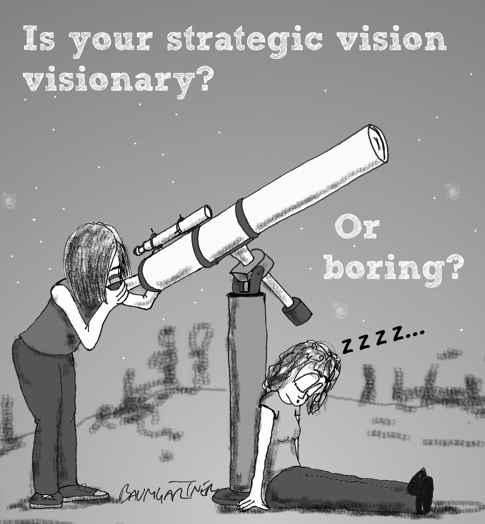Is Your Strategic Vision Visionary or Boring? By Jeffrey Baumgartner

Probably the most important sentence your company ever puts to paper is your strategic vision statement. It defines your organisation, your goals and the paths you take. A bold, visionary statement is the first step in establishing your firm as a bold, visionary leader. A mediocre statement keeps you on a path of mediocrity, trailing behind the visionary leaders. A lack of any vision leaves it to your customers and employees to assign a mediocre vision statement to your company. And they will.
Whether yours is a global organization or a one-woman business operating out of Poughkeepsie, your strategic vision statement should be but a few words, but those words are vitally important to where your company is going and how it is going to get there. Think about the leading company or two in any field and you probably have a good idea of their strategic visions. Think about Apple, Walmart, Facebook, Versace, Porsche, Victoria’s Secret.
In short, success for your business starts with a strategic vision statement and then flows through communication to your employees, customers, future customers, business partners, other stakeholders and your community.
Moving Goal
A vision statement is essentially a moving goal that you aspire to chase after. The moving bit is important. You do not ever want actually to achieve the goal defined in your vision. If your vision is to sell 100 coffee mugs by next Wednesday, you’ll be lost come Thursday. On the other hand if your vision is to create unique, designer coffee mugs in limited batches of 100 which will only be sold for one week, you’ve got something that will keep you busy indefinitely.
Avoid Being Best Like the Plague
Amazingly, in view of the critical importance of a strategic vision statement, a large number of companies either have no defined vision or a vague, meaningless one. The worst thing you can do in crafting a strategic vision statement is to use the word “best” − it is almost certainly an indication of mediocrity and lack of vision. To understand why, the next time you are with a group of friends, ask everyone who makes the best pizza (or any popular food) in your city. The chances are you will get several different answers and a few disagreements. That’s because best is a meaningless word unless precisely defined − and even then it is dubious.
Or, look at it this way, you are visiting a new city and see three pizzerias. One claims to be the best pizzeria. The other makes no claim and the third claims to be a family owned restaurant specialising in novel pizzas made with fresh locally sourced ingredients. Which is likely to get your business?
Be Different
No company ever became the market leader by being the same as everyone else in the field. Think about it. In order to have a field in which everyone is the same, there had to have been a visionary who defined normal behaviour in that field.
Your strategic vision statement should be unique. It should carve out your niche in the market place and allow you to own that niche. That can be scary. For most organisations, like people, it feels safer to follow the leader than to go off in your own direction. But you will know you have succeeded when you look back and find other companies following your lead.
- Published in Blog
Establish Expertise Inside Your Company
In a competitive marketplace, developing a reputation as an expert is one of the best forms of career insurance. Having a blue-chip personal brand is powerful for international thought leaders, who can leverage it to command exorbitant speaking fees. But it’s also helpful for professionals who work inside corporations, where a great reputation can bring coveted promotions and opportunities. Here’s how you can become recognized for your expertise inside your company.
First of all, it’s important to recognize that you don’t have to start out as a worldwide expert. Too many people discount their value. You can coach others on writing better business memos even if you’re not Shakespeare, or lead an office running group even if you’re not Usain Bolt.
Michael Leckie was a vice president of human resources for a prominent research company when he developed an interest in coaching. Although the subject was related to his job, it wasn’t part of his actual responsibilities—he simply began studying it because he wanted to. He started out as a novice, compared to worldwide authorities, but he quickly grew to be one of the most knowledgeable people about talent development within his company. “When you start building your brand in a corporation, it’s a confined space,” he told me in an interview for my new book, Stand Out. “You don’t need to be the best in the world; you just need to be the best one there. You can be a big fish in a little pond, and if you’re the biggest fish in that environment, you get bigger and can then start to do things outside the organization.”
In these early stages, it’s important to be clear about what you know and what you don’t. If you try to prematurely position yourself as an expert who can compete with industry giants, you risk losing credibility when you’re faced with a question or challenge you’re unsure about. But if you’re honest about where you are in the process – experienced with some facets and still learning others – then others are likely to respect you for your superior knowledge and not hold it against you if you don’t know everything.
As your profile grows, it’s also important to ensure that your company understands the value of your public brand. This is especially important if, like Leckie, you’re cultivating expertise on a subject that isn’t part of your core responsibilities. “My world is [the firm], so I need to have my brand aligned to what matters to them,” says Leckie. Developing his coaching brand began to raise Leckie’s professional profile in general, which eventually to led to an invitation to give a keynote talk for a client’s conference of technology leaders. The keynote was an exciting opportunity for him, but his superiors could have viewed it with suspicion (Why is he getting all this attention? Why isn’t he concentrating on his real job?) if he hadn’t taken the time to show them how it was relevant to the company’s business objectives.
“With outside things, you have to make sure you’re explaining them [in terms of] what matters in the organization,” said Leckie. “Otherwise, they start to look, to some, like a distraction.” He didn’t assume his boss’s boss would understand why it was important for him to speak at the conference – rather, Leckie explicitly articulated the keynote’s business benefits to him. “What he’ll be excited about is great interactions with the client,” Leckie said, “and that I’m out there developing business and increasing the relationship they have with us.”
Finally, it’s important to recognize when it’s time to expand what you’re known for strategically. “Sometimes your brand is more happenstance than thoughtful,” says Leckie. “It may be about things you like, but it’s not necessarily leading you where you want to be moving toward.” Leckie realized he’d been so successful at building his expert reputation around coaching and talent development that those skills — even though they were valuable for an HR leader — were beginning to overshadow others that were deemed more critical inside his company. “My brand got established and it opened the door, but it also began to shut other doors. It became clear to me that while I was really good at building and driving a team that got great business results, when people were talking about me, it wasn’t about business results; it was about the more unique elements of my brand [such as coaching].”
That’s why he decided to make coaching a “sub-brand.” In other words, he didn’t abandon it, but he started emphasizing it less in favor of talking about his ability to drive the bottom line. “It’s giving people a language of how to think about you subtly,” he says, by shifting the topics you discuss and by enlisting friendly ambassadors to highlight your relevant accomplishments. That’s been especially important to him as he’s risen in the ranks of his company and now holds a broader leadership role.
It’s slightly trickier for professionals to build a strong personal brand inside a company, as compared to entrepreneurs or other free agents. You have to balance the unique mix of your skills and interests with your company’s needs and sensibilities. But when done right, cultivating a brand as a “local expert” inside your company can enhance your professional reputation and ensure you’re valued the way you should be.
- Published in Blog, Uncategorized
- 1
- 2

